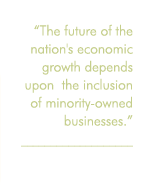



The Birmingham Test When former Mayor Richard Arrington attempted to establish a 10-percent set-aside program for blacks and women in City construction contracts, the Association of General Contractors (AGC) sued the City, and won, says current Mayor Bernard Kincaid. The settlement of that federal suit led to the creation of a voluntary system through the Birmingham Construction Industry Authority (BCIA), which Kincaid calls "archaic" and "a dismal failure," especially compared to what Atlanta has accomplished in terms of leveling the playing field. Others looking for signs that the state of minority business in Birmingham is significantly better are also disappointed. An analysis of U.S. Census data from 1997 (the most recent data available at the time of this article) reveals that firms in the Birmingham metro area generate $75 billion in sale receipts. Minority firms generate just 11% of that amount, $580 million, even though minorities comprise about 30% of the population. Black-owned businesses generate less than half of 1% of sales, an unimpressive 0.3%. "That's woeful; that's pitiful," said Bob Dickerson , executive director of the Birmingham Business Resource Center , which provides management training and helps minority firms find loans. Del Davis, a black contractor in Birmingham , says the findings cement economics as blacks' top civil rights challenge today. "Forty years after all the marching, preaching and hand clapping, we are still riding in the back of the bus and drinking from the 'blacks only' water fountain" in terms of economic opportunities, he says. "Local minority firms (if they get in the deal) normally have to split the 'black piece' of the pie, which normally amounts to token crumbs." Minority inclusion and empowerment is bigger than just economic justice or feel-good political correctness. A 2002 joint report from the Milken Institute and the Minority Business Development Agency says that: • Entrepreneurs fuel the American economy; they are its most important source of jobs, income and wealth creation. • Minorities are forming businesses at a much faster rate than their non-minority counterparts. • Minority businesses tend to create more jobs for minorities. • As minorities grow to comprise a larger percentage of the American population, their success - or failure - will have a profound effect on the entire American economy. "The future of the nation's economic growth depends upon the inclusion of minority-owned businesses and the minority business workforce, and access to capital for minority-owned businesses is absolutely essential for the healthy development of this growing sector of American business," the report says. So what is being done to change the "pitiful" state of minority-owned business in Birmingham ? Not much, until recently. • Kincaid has recently won City Council approval to fund a $575,000 disparity study, what he deems a necessary first step to create a new minority set-aside program, one that can withstand the legal challenges that are sure to come against it. • Leaders of BCIA says the organization continues to help scores of blacks, women and other minorities get millions of construction dollars that they might not get otherwise, contrary to Kincaid's criticisms. • Black and white partners in a joint business, with the Birmingham Regional Chamber of Commerce, recently organized the first annual Diversity Summit, aimed at informing businesses about the economic reasons for creating racial equity in the marketplace. And Dickerson is challenging Birmingham leaders to make helping black businesses a higher priority through the A.G. Gaston Economic Empowerment Conference (see sidebar). |
|
SUBSCRIBE l ABOUT US l FEATURES l PERSPECTIVES l LATEST VIEWS l COMMUNITY CHEST Website
Development: Deidre Ali Creative
Services, LLC |
